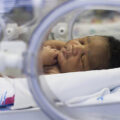
Family Features
Birth defects, structural changes†that†affect one or more parts of the body, are the leading cause of infant mortality. A baby is born with a birth defect every 4.5 minutes, according to the U.S. Centers for Disease Control & Prevention (CDC).
Birth defects most often develop during the first three months of pregnancy, when a baby’s organs are forming. Not only can they affect mortality, but they can also cause problems for a baby’s overall health and how the body develops and functions.†Common birth defects include congenital heart defects, cleft lip, cleft palate and spina bifida.
Genetics, behaviors and†social and environmental factors†can†impact†the risk for†birth defects, and not all birth defects can be prevented. To help improve the lives of people living with birth defects, consider this information from the experts at March of Dimes, who aim to provide knowledge about what birth defects are, how to prevent them and their impact across all stages of life.
Pregnancy
Although not all birth defects can be prevented, people can increase their chances of having a healthy baby by managing health conditions and adopting healthy behaviors before becoming pregnant.
When planning a pregnancy, see a health care professional and start prenatal care as soon as possible. Talk about taking any medications you’re currently taking (or might need during the pregnancy), including vitamins. Most doctors recommend women take 400 micrograms of folic acid every day before and during pregnancy to help prevent birth defects.
Also discuss vaccinations (including COVID-19, since pregnant women are at elevated risk for severe COVID-19 illness) and other medical concerns, such as how to manage diabetes. Avoid overheating and treat fevers and infections promptly. Avoid alcohol, smoking cigarettes and marijuana or other drugs during pregnancy.
Infancy
If your baby is diagnosed with a birth defect during pregnancy, or born with a birth defect or other health condition, he or she may need special care to aid growth and development. Many children with birth defects lead long and happy lives. However, birth defects remain critical conditions that can cause lifelong challenges.
Advancements such as improved newborn screening and early detection of birth defects can help pinpoint potential problems and ensure the baby begins receiving supportive care for better survival rates and quality of life. Examples include newborn screenings for critical congenital heart defects and monitoring bladder and kidney function in infants and children with spina bifida.

Childhood
Meeting the complex needs of a person with birth defects involves the whole family and can be challenging at times. Finding resources, knowing what to expect and planning for the future can help. Early intervention services and support include special education, speech therapy and physical therapy. These can have a significant impact on a child’s ability to learn new skills, overcome challenges and increase success in school and life.
Some babies born with birth defects may also have physical and intellectual disabilities. The exact ages of developmental milestones are different for each child. Families, educators and health care providers can work together to set meaningful goals and create a plan to help children living with birth defects reach their full potential.
Adolescence
Adolescents and young adults living with birth defects may face unique challenges as they transition from childhood to adulthood. They may need to navigate changes in insurance and transition from a familiar pediatric specialist to a new adult doctor. It’s important for people with birth defects and their families to begin planning for this transition during childhood so they can lead healthy, independent lives as adults.
Other areas of focus might include medications, surgeries and other procedures; mental health; social development and relationships within and outside the family; physical activity; and independence.
Adulthood
With every pregnancy, a woman starts out with a 3% chance of having a baby with a birth defect, regardless of underlying health conditions or lifestyle factors, according to the CDC.
Many women with birth defects and other health conditions have healthy, uneventful pregnancies. However, women with birth defects may be more likely to have a baby with a birth defect. People living with birth defects should talk with their health care providers before becoming pregnant about how a pregnancy might affect them and their baby.
Having someone in your family with a birth defect also increases your chances of having a baby with a birth defect. To learn more about your genetic risk of having a baby with a birth defect, talk with a clinical geneticist or a genetic counselor.
Learn more about birth defects by following #EveryJourneyMatters and #BirthDefects on social media and visiting†marchofdimes.org/birthdefects.
Tips to prevent birth defects
Not all birth defects can be prevented, but you can help reduce the risk and increase your chances of having a healthy baby by following these steps.
- Get a preconception checkup before you start trying to get pregnant.
- Ensure your vaccinations are up to date. Some vaccinations protect you from infections that can cause birth defects and updating certain vaccinations may mean you need to wait before trying to become pregnant.
- Take a vitamin supplement that includes 400 micrograms of folic acid every day.
- Learn about your family health history. If you, your partner, your children or someone in your families has a birth defect, you may want to see a genetic counselor to learn more about your risk.
- Work with your health care provider to manage chronic health conditions, such as diabetes.
- Talk to your health care provider about medicines you take, including any prescriptions, over-the-counter medicines, supplements and herbal products. Certain medicines may increase your baby’s risk of a birth defect.
- Reach a healthy weight. Being obese can increase your baby’s chances of having birth defects like neural tube defects, heart defects and cleft palate.
Photos courtesy of Shutterstock
Source: March of Dimes

















Leave a Comment